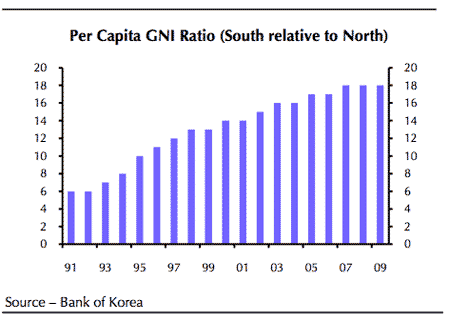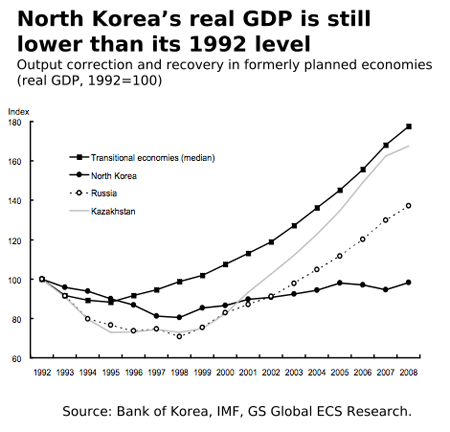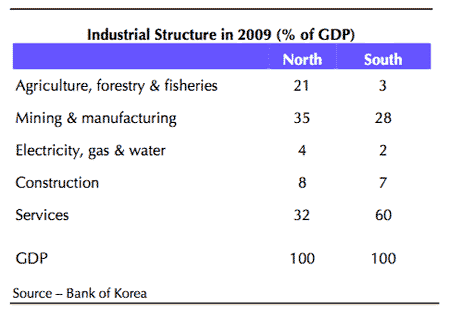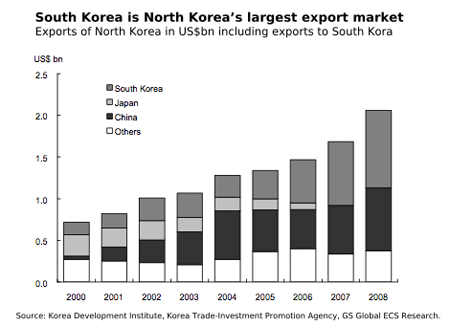Who's investing in North Korea?
There is very little data on North Korea's economy. And what information there is paints a grim picture. The rigidly controlled economy is a disaster on every level. But the country is not quite as closed as you might think, says Cris Sholto Heaton: someone is doing business there. Here he looks at what's going on in one of the world's most secretive nations.

Get the latest financial news, insights and expert analysis from our award-winning MoneyWeek team, to help you understand what really matters when it comes to your finances.
You are now subscribed
Your newsletter sign-up was successful
Want to add more newsletters?

Twice daily
MoneyWeek
Get the latest financial news, insights and expert analysis from our award-winning MoneyWeek team, to help you understand what really matters when it comes to your finances.

Four times a week
Look After My Bills
Sign up to our free money-saving newsletter, filled with the latest news and expert advice to help you find the best tips and deals for managing your bills. Start saving today!
This week, I'm going to look at a country you've probably never read an economic analysis of before: North Korea.
I'm not going to be covering it regularly. I doubt any of us will be putting our money there any time soon. But there's more going on than you might expect.
A human and economic disaster
It goes without saying that we don't have much good data on the North's economy. I still have nightmares about trying to write a report on its energy needs many years ago.
MoneyWeek
Subscribe to MoneyWeek today and get your first six magazine issues absolutely FREE

Sign up to Money Morning
Don't miss the latest investment and personal finances news, market analysis, plus money-saving tips with our free twice-daily newsletter
Don't miss the latest investment and personal finances news, market analysis, plus money-saving tips with our free twice-daily newsletter
But South Korea's central bank produces approximate estimates each year. They paint a predictably grim picture. Gross national income per head in the North is about 1/18th of that in the South. This gap has trebled since estimates began in 1991.

The North's centrally-planned economy with rigid state control of everything and an ideology of 'juche' (self-reliance) is a disaster on every level. The Soviet Union was its key trading partner and supporter. When that collapsed, the North Korean economy went into freefall for most of 1990s. GDP is still below the level of 1992. The human cost was appalling even by the country's abysmal standards. Up to three million people are thought to have died as famine swept the country.

But you shouldn't fall for the idea that the North is a country full of long-suffering peasants. The people are long-suffering, sure, but they're not all peasants by any means. This is a country that's capable of building rocket systems and nuclear bombs. So it obviously has extensive industry.
Agriculture accounts for around 20% of the economy and about 40% of the work force. The rest of the economy includes not just thousands of steelworks (Kim Jong-Il seems to have a particular enthusiasm for giving his 'work guidance' sessions at steelworks) but some fairly capable manufacturing and services.

Who's investing in the North?
Similarly, while the North is a mostly closed economy, it's not quite as closed as you might think. Foreign firms do business there, mostly in export-orientated manufacturing to take advantage of the extremely low labour costs. South Korea and China are by far the two biggest immediate export destinations.

Best known is the Kaesong Industrial Region. This is a special economic zone on the border with the South. Around 100 South Korean companies employ about 40,000 North Korean staff between them, and make about 20% of the North's exports.
The Chinese also invest in manufacturing in the north of the country, especially in low margin areas such as clothing, as Chinese firms try to cope with even lower-cost rivals in countries such as Bangladesh.
There's foreign investment in the North's natural resources too. And perhaps more surprisingly, the country also has a capable IT outsourcing industry. Commissions reportedly include coding software for mobile phones and doing computer-based animation.
Within the last couple of years, Egyptian telecoms and construction group Orascom was awarded a concession for a 3G mobile phone network. (Obviously, this is only available to privileged North Koreans with money and senior positions). Last month, Orascom reported that its subscriptions had quadrupled year-on-year to 300,000 (the population is around 22 million).
I've heard of at least three specialist foreign law firms with offices in Pyongyang aimed at potential foreign investors. And a year or two ago, there was even a fund called the Chosun Fund, headed by a former international representative for North Korea, trying to raise money for direct investment.
A capricious state
The problem is the North will never be consistent in anything. For example, the 1990s crisis forced the government to relax some of the state's control of commerce within the country. Limited private markets sprang up, which led to some improvements. But the leadership was clearly never happy with this dalliance with capitalism. In the last few years, it moved to suppress them again.
Late last year, it carried out a currency 'reform' that wiped out most of the savings and capital that the country's traders had built up. This reportedly led to soaring food inflation and, unusually, public protest, including anti-Kim graffiti. The alarmed government made its head of economic planning the scapegoat and shot him.
There's little doubt that the North has been going through an exceptionally bad patch in the past year. This may explain recent acts such as the sinking of a South Korean warship and the shelling of an island. By persuading the rest of the world that it can be unpredictably stupid and violent when threatened, it can convinces them that it's better to keep bribing it to keep quiet with food aid and other concessions, rather than cranking up the pressure. It may also suggest a power struggle within the leadership.
Don't hold your breath for reform
Is there any sign this might change? We know very little about North Korean politics. So it's hard to say if there are any senior figures who might push to bring about the kind of free market reforms that China is urging the leadership to adopt. But the answer is "probably not".
With Kim Jong-Il ailing, attention is on his son Kim Jong-eun, the recently anointed leader-in-waiting. But the younger Kim is purely a princeling at this stage. Far more important are those who will probably be his minders: Kim Jong-Il's sister Kim Kyung Hui and her husband Chang Sung Taek.
Chung is the chairman of the National Defence Commission, believed to be the top decision-making organisation in the North. He is probably the second-most powerful individual in the state. These two are apparently hardliners in any case, while the award of senior military ranks to both Kim Jong-eun and Kim Kyung Hui reinforces the fact that the conservative military remains the main power.
None of this argues for reform, openness and a saner international policy. The main question is this: can the current set-up can survive Kim's death for long and unify round his son as a figurehead? Or will the loss of the regime's central figure lead to infighting? Kim Jong-Il managed the transition from his father Kim Il-Sung. But he was more established and experienced than his son and did so at a more favourable time.
So it's possible that the system will implode relatively soon. The recent cables released by Wikileaks show that some in the South Korean government believe that.
But then, the fall of the North has been imminent for some time, yet it staggers on. So there's no guarantee they're right. And no-one really wants the current regime to implode. The result could be millions of refugees; fighting between different factions; the North's nuclear, chemical and biological arsenal potentially disappearing to be sold to terrorists; and many other problems. As a result, the cost of keeping the North going with foreign aid (which is probably around $3bn a year) is considered money well spent to keep the problem relatively contained.
What happens when the regime runs out of allies?
But the North is making this increasingly difficult. The current president of South Korea, Lee Myung-bak, is taking a tougher line than his predecessor, whose 'Sunshine Policy' of more trade, aid and investment was intended to bring about reconciliation. Another North Korean attack might well be met by a heavier military response. (That said, the recent attacks are not the furthest the North has pushed things in the past. In the 1980s, it bombed a South Korean airliner and assassinated several of the cabinet on a visit to Burma.)
On the Chinese side, the Wikileaks cables provide more evidence of something that has been fairly apparent for a while: there is a clear split in attitudes towards the North in Chinese political circles.
Some older, more conservative figures will still support the North for ideological and emotional reasons. China was the North's main ally in the Korean war against 'imperialist oppression' and an estimated 200,000 to 500,000 Chinese died in the conflict. Many in the military still regard the country as a vital buffer against the US.
Others will be rather less keen, but want to avoid the problems the collapse of the North could cause and would prefer to keep the status quo for as long as possible. But many younger politicians are reportedly embarrassed about their support for this Cold War relic. That increasingly seems to mesh with public opinion, which is now more important in China than many outsiders realise.
China's preferred option has been to prod the North towards reforms for a long time. But the cables emphasise something that was fairly apparent anyway. China's influence is more limited than many tend to think, and its irritation with the Kim regime is growing. There's clearly a faction that's comfortable with a unified Korea under the control of the South, as long as no US troops are stationed too far North. In fact, if it led to the US no longer having a reason to be in Korea at all, that would suit China very well, although complete withdrawal seems unlikely.
So it seems possible that within a few years, power struggles and a steady loss of support from China will force the North to begin an orderly opening-up or simply collapse. That's likely to be pretty unpredictable. But what might the consequences be for the South?
The huge cost of reunification
I have always had reservations about South Korea as an investment. Corporate attitudes towards shareholders are poor, with derisory dividends. Demographics are not good. And while it has many companies with advanced technology, it will face increasingly tough competition in these industries from China. And unlike Taiwan, which would otherwise be in a similar situation, the mainland has no incentive to grant it favours.
On top of this, there's the situation with the North. I think many investors look at this the wrong way. If the North tipped over the edge and provocation turned into war, there's no doubt that the deaths and destruction in the South would be high. Seoul is well within range of its artillery. You would not want to be there at the time.
But there is also no doubt about what the outcome of any war would be, or how quickly it would be over once the South and America committed themselves. Afterwards, the threat from the North would be gone and the South would rebuild quickly.
Rather, the problem is reunification, which may be best for everyone involved, but will come at a high cost. Consider how West Germany struggled to reunify with the East. And bear in mind that the North is larger relative to the South than was the case in Germany. The income gap is much greater, but even worse, private ownership of property is non-existent and market systems are very limited. It's going to be very hard for North Koreans to adjust to the modern world.
The only thing going for it is a younger population, low wages and fairly good education (in the sense of employable skills). So companies would be keen to invest there. Given what we already know, it's not a stretch to imagine what would happen when a sane political and legal system is in place.
But reunification will be expensive regardless. Official estimates range from US$300bn-US$1.2trn. Given that Germany's reunification cost about US$2trn, that might well be optimistic. But if you take the middle of that range and put it over ten years, that's about 10% of the South's GDP each year. Obviously, the South won't bear that alone but the process is likely to be a huge drag on it for many years to come.
So from a human point of view, the sooner the North is free of its dictatorship, the better. But for investments in the South, I think it could be a very difficult time.
This article is from MoneyWeek Asia, a FREE weekly email of investment ideas and news every Monday from MoneyWeek magazine, covering the world's fastest-developing and most exciting region. Sign up to MoneyWeek Asia here
Get the latest financial news, insights and expert analysis from our award-winning MoneyWeek team, to help you understand what really matters when it comes to your finances.

Cris Sholt Heaton is the contributing editor for MoneyWeek.
He is an investment analyst and writer who has been contributing to MoneyWeek since 2006 and was managing editor of the magazine between 2016 and 2018. He is experienced in covering international investing, believing many investors still focus too much on their home markets and that it pays to take advantage of all the opportunities the world offers.
He often writes about Asian equities, international income and global asset allocation.
-
 Can mining stocks deliver golden gains?
Can mining stocks deliver golden gains?With gold and silver prices having outperformed the stock markets last year, mining stocks can be an effective, if volatile, means of gaining exposure
-
 8 ways the ‘sandwich generation’ can protect wealth
8 ways the ‘sandwich generation’ can protect wealthPeople squeezed between caring for ageing parents and adult children or younger grandchildren – known as the ‘sandwich generation’ – are at risk of neglecting their own financial planning. Here’s how to protect yourself and your loved ones’ wealth.